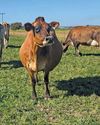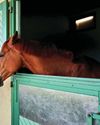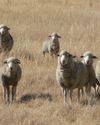試す 金 - 無料
Rinderpest: a continuing threat to livestock
Farmer's Weekly
|September 25, 2020
Despite rinderpest being finally eradicated from nature in 2011, the threat of re-emergence remains. The Food and Agriculture Organization of the United Nations has therefore continued to urge farmers to learn the symptoms of the disease, and to notify state veterinarians if they suspect an animal may be showing signs of rinderpest.

Few animal diseases have caused as much devastation and economic loss as rinderpest. While having been eradicated from the natural environment, there is some risk that the disease will re-emerge due to governments and laboratories across the world holding on to rinderpest stock. Such a re-emergence could lead to food insecurity and huge financial losses, according to the Food and Agriculture Organization of the United Nations (FAO), and it is for this reason that the FAO and the World Organisation for Animal Health’s (OIE) education on the subject continues to be of great importance. The re-emergence of rinderpest would undermine veterinary biosecurity, result in the restriction of local and international trade, and endanger wildlife, as well as threaten animal welfare and rural livelihoods.
Moreover, it would cost millions of dollars to re-eradicate the disease once again.
The Global Rinderpest Eradication Programme initiated by the FAO and OIE in 1994 led to the successful eradication of rinderpest in 2011, making it the first animal disease to be completely eradicated from nature. It has been estimated that the eradication of rinderpest has saved Africa alone around US$920 million (about R15,42 billion).
HISTORY
Rinderpest is considered the deadliest animal disease in history, and according to the website animalresearch.com, the first outbreak was recorded in 376 CE. While the devastation of the disease led to the establishment of veterinary schools throughout Europe, the disease was not adequately contained, and it was brought to Africa by European settlers in the late 1800s. An outbreak of rinderpest in 1890 caused the death of millions of cattle and was responsible for the starvation of about a third of the human population of Ethiopia and Tanzania respectively.
WHAT IS RINDERPEST?
このストーリーは、Farmer's Weekly の September 25, 2020 版からのものです。
Magzter GOLD を購読すると、厳選された何千ものプレミアム記事や、10,000 以上の雑誌や新聞にアクセスできます。
すでに購読者ですか? サインイン
Farmer's Weekly からのその他のストーリー
Farmer's Weekly
Farmers 'unilateral victims' of climate
Gyeongbuk Provincial Council member Choi Taerim has demanded immediate and substantial support for apple farmers in the South Korean province, urging immediate measures for apple farmers affected by heat damage be implemented, The Asia Business Daily recently reported.
1 min
November 21-28, 2025

Farmer's Weekly
Top agri workers celebrated in the Western Cape
Shannon Robertson, assistant livestock manager at Boschendal near Franschhoek, was crowned the overall winner of the 2025 Western Cape Prestige Agri Awards, held in Durbanville.
1 min
November 21-28, 2025

Farmer's Weekly
Smart dairying: running Jerseys on pasture
The dairy farming sector has seen innovation in milk parlour and cow comfort technology that have allowed farmers to not only yield higher volumes, but extend the productive lifespan of their cows. Albrecht de Jager told Henning Naudé about his approach to maintaining a pasture-raised Jersey herd while utilising precise data measuring technology to ensure quality milk output and optimal cow comfort.
6 mins
November 21-28, 2025

Farmer's Weekly
High-performance dairy farming in the Eastern Cape: the Rufus Dreyer approach
Dairy farming is often described as one of the most technically demanding and strategically complex branches of agriculture.
6 mins
November 21-28, 2025

Farmer's Weekly
Design your stables and camps to assist in AHS control
Keep horses away from areas where disease-carrying midges multiply, like natural pools, lakes, streams and dams, advises Dr Mac.
2 mins
November 21-28, 2025

Farmer's Weekly
The rolling chant that has echoed through SA over the past 30 years
Johan van der Nest is renowned in auction circles and was the first freelance stud-stock auctioneer to begin operating in South Africa.
10 mins
November 21-28, 2025

Farmer's Weekly
Flight from the Red Army
The fall of the Third Reich in 1945 was defined by the Red Army's brutal invasion of Germany. Mike Burgess tells how the Hoppe family trekked from Finowfurt near Berlin to Preetz in Schleswig-Holstein to escape the brutality.
6 mins
November 21-28, 2025

Farmer's Weekly
How to plan a pre-sale feeding programme
Proper feeding of animals before a sale can help producers catch the eye of buyers and increase profits, but it is important to choose the right ration.
8 mins
November 21-28, 2025

Farmer's Weekly
How women are transforming coffee production in Kenya
A group of Kenyan smallholder women farmers are transforming the country's high-value coffee sector by pooling their resources.
5 mins
November 21-28, 2025

Farmer's Weekly
Tough times ahead for SA's grain farmers
Grain farmers face a difficult year ahead with lower grain prices and high production costs
3 mins
November 21-28, 2025
Translate
Change font size

